During day two of the 2023 Notre Dame Religious Liberty Summit in London, attendees heard thought-provoking dialogue on religious liberty and international tribunals, religious liberty in the corporate space, and legal developments in the U.S.
We also had the privilege of hearing from two dynamic keynote speakers: Nazila Ghanea, special rapporteur on freedom of religion or belief (FoRB) with the Office of the United Nations High Commissioner for Human Rights and Fiona Bruce, UK Prime Minister’s Special Envoy for Freedom of Religion or Belief.
WEDNESDAY, JULY 12
HIGHLIGHTS FROM THE KEYNOTE
Nazila Ghanea: Special Rapporteur on Freedom of Religion or Belief (FoRB) with the Office of the United Nations High Commissioner for Human Rights
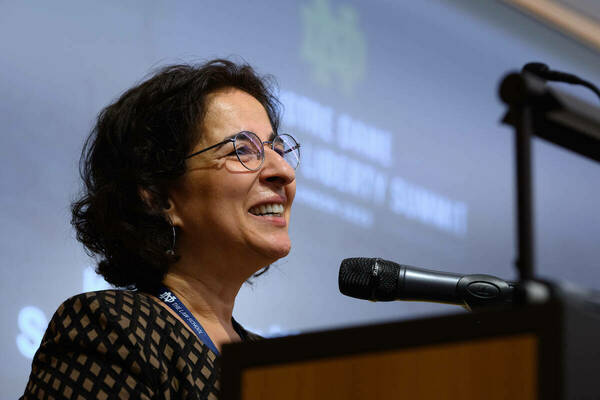
Nazila Ghanea explained her mandate as UN Special Rapporteur. Her work is focused on freedom of religion or belief, based on the standards of the international law concerning human rights.
She touched on the urgent debate occurring right now at the United Nations to “discuss the alarming rise in premeditated and public acts of religious hatred as manifested by recurrent desecration of the Holy Quran in some European and other countries.”
She described the meaning of Article 18, the Universal Declaration of Human Rights that says we all have the right to our own beliefs, to have a religion, have no religion, or to change it.
She called attention to specific human rights issues and their effects on certain communities whose access to the law has been trampled on. She also discussed the limitations and challenges of her mandate.
When describing the actors who are currently involved in this fight she called on more people to get involved, including participants of the 2023 Notre Dame Religious Liberty Summit.
PANEL 1
Religious Liberty and International Tribunals
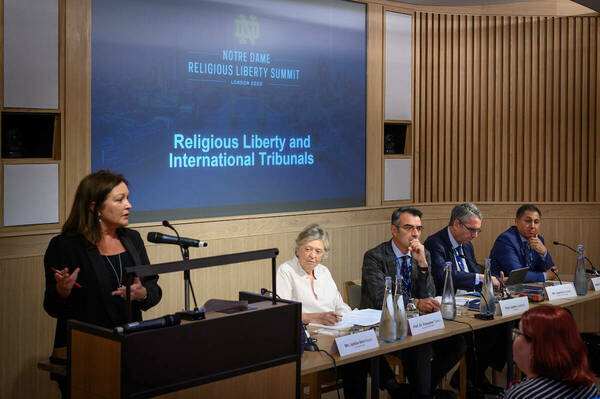
“Judges are not expected to adhere to the views of plaintiffs that come before them. I do believe they are required to acknowledge and appreciate that religious claims have views that are based on reason and to believe that what we are between birth and death is not the whole story.”
“Never underestimate the power of the message that judges are communicating. Never underestimate the power of the dissenting voice.”
Justice Ann Power, Court of Appeal, Ireland
“In a rapidly evolving European society, the main question is not to protect the religious feelings or sensibilities of the believers of a certain religion through blasphemy laws, like was the case many decades ago in European countries, but to defend religious peace and to prohibit incitement to religious discrimination, religious hostility, and religious violence.”
Ioannis Ktistakis, European Court of Human Rights
“As we all know, freedom of religion is considered by the European Court of Human Rights as one of the foundations of democratic society. It means that freedom of religion is a vital factor in forming the identity of believers and their conception of life, but it is also a precious asset for atheists, agnostics, skeptics, and the unconcerned. The pluralism indissociable from a democratic society, which has been dearly won over the centuries, depends on it.”
Professor Dr. Françoise Tulkens, European Court of Human Rights
“In general, because the Inter-American Court does not recognize the doctrine of margin of appreciation, states have less leeway in deciding how to balance religious liberty against other rights, in comparison to Europe. Protection of tolerance and equality rights is robust in the Inter-American system."
Professor James Cavallaro, Yale University
“The autonomous existence of religious communities is indispensable for pluralism in a democratic society and is thus an issue at the very heart of the protection which Article 9 of the Convention affords.”
“Article 9 of the Convention does not enshrine a right of dissent within a religious community; in the event of any doctrinal or organizational disagreement between a religious community and one of its members, the individual’s freedom of religion is exercised by the option of freely leaving the community. The Court has frequently emphasized the state’s role as the neutral and impartial organizer of the exercise of various religions, faiths, and beliefs.”
Hon. Armen Harutyunyan, European Court of Human Rights
PANEL 2
Challenges and Opportunities for Religious Liberty in the Corporate Space
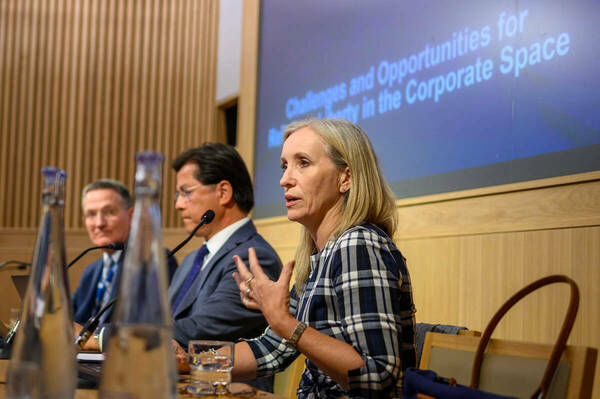
“The challenge is including religion as part of DEI in the workplace. There is an opportunity within corporations … with hundreds of thousands of people building religious freedom from the ground up by having company-sponsored employee resource groups based on faith, grassroots movements, and religious freedom in corporations.”
Dr. Brian Grim, Religious Freedom & Business Foundation
“Religious liberty in corporate spaces fosters respect and enhances the well-being of employees. When individuals can fully be themselves and practice their religion freely, they feel more respected and happy. When religious liberty is taken away, employees may feel uncomfortable and alienated in their work environment."
“Workplace diversity is one of the most important aspects of productivity. Religious liberty allows people from different backgrounds to enter corporate spaces and enables them to feel safe at their jobs.”
Commissioner Nury A. Turkel, United States Commission on International Religious Freedom
“Normal procedures for human rights violations failed. We need to look for alternative avenues to press back on what China is doing. The lifeblood of what allows China to get away with these gross violations is money.”
“The whole idea of corporate social responsibility came out of faith traditions wanting their investments to align with their values. Our government pension funds should not be invested in companies that are involved in creating and supporting China’s violations of human rights. If other actors in the marketplace are willing to align their values along these lines, including faith communities that support religious freedom and freedom of religious belief, this can be a powerful countervailing force.”
Ambassador Kelley Currie, Center for a New American Security
PANEL 3
Religious Liberty Legal Developments in the U.S.
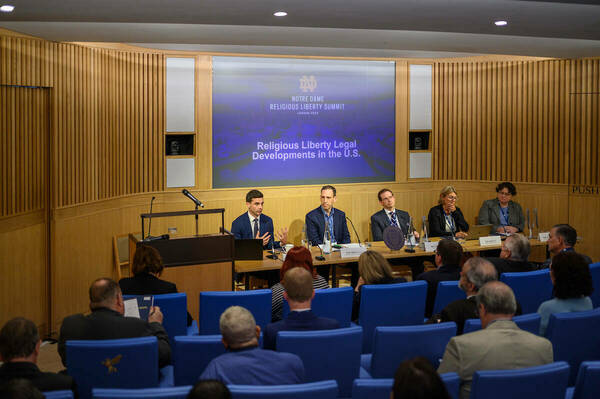
“All of us have the opportunity to think about and study, and help answer the court’s questions that help shape these doctrines, but we also have a responsibility to get it right. Victories are only so helpful if they are on solid grounding of rule of law and constitutional.”
John Meiser, Notre Dame Law School Religious Liberty Clinic
“Regarding Groff v. DeJoy, the Supreme Court said that there has to be a real burden on the employer or you ought to accommodate. That is a really good development. It is good to see all nine agree on an important religious liberty issue that is going to help a lot of real, actual employees. It is, frankly, the way a decent pluralistic society ought to behave.”
Professor Mark Rienzi, The Catholic University of America Columbus School of Law
“I suggest a non-categorical approach that brings First Amendment protections more in line with free speech, a nuanced approach that focuses on the nature of the subject matter of the claim that is already reflected in free exercise jurisprudence.”
“If you want all of the stability of religious protections to be stable, it is worth finding something that resonates broadly enough that it will survive.”
Professor Elizabeth Clark, Brigham Young University J. Reuben Clark Law School
“There has been an evolution from a focus on the meaning of a specific display or expression judged from a reasonable observer to a more general appeal to history as a presumptive basis for finding these public expressions as constitutional.”
“Monuments themselves tell a story, and when the court describes their meaning, it is also telling a story. The court is continuing the work that the monuments themselves are doing by suppressing alternate non-Christian narratives and asserting the association of Christianity with national identity.”
Professor Jessie Hill, Case Western Reserve University School of Law
“Administrative law has a vast impact on religious liberty in a domain that courts can’t easily reach. The government can do quite a bit to promote or disfavor the exercise of religion, and much of what the government does in that space is done by federal agencies.”
“Proponents of religious liberty should favor and ask for a review of regulations because presidents and their advisors are more likely to take religious liberty seriously.”
Hon. Paul Ray, The Heritage Foundation
HIGHLIGHTS FROM THE KEYNOTE
MP Fiona Bruce: UK Prime Minister’s Special Envoy for Freedom of Religion or Belief
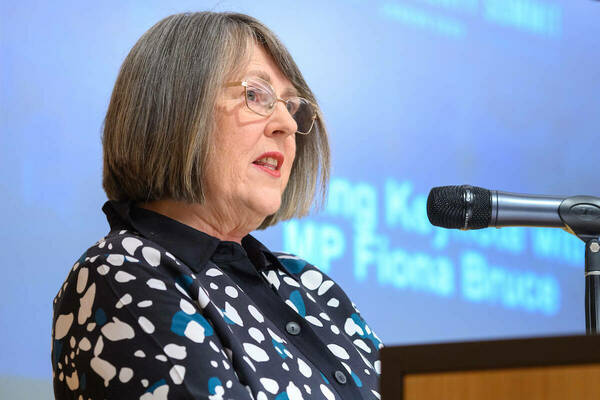
Bruce’s views expressed below are her personal views alone and are not representing his Majesty's government or IRFBA collectively.
Fiona Bruce shared her practical experiences and reflections from her role as chair of the International Religious Freedom or Belief Alliance (IRFBA). She focused on the need to be bolder and braver and to turn more of our words into actions in order to make a real positive difference for those who suffer freedom or religious violations.
FoRB is a foundational human right, but sadly, she said FoRB violations are increasing across the world, so we need to be bolder and braver to challenge those violations.
“They need not just our voices, but our partnership. Not just our words, but our actions. Not just our good will, but our good deeds,” she said.
She said a lot of collaboration is being done in the FoRB community and it is more connected, but we need to connect more with those beyond the FoRB communities. For example, she encouraged collaboration with individuals whose work centers on countering violence against women and providing international aid. In addition, she advocated for more engagement with religious leaders who are influential in peacebuilding, as they can also play a significant and proactive role in furthering FoRB protection and dialogue.
“Collective voices of all of us are stronger than our individual voices alone,” she said.
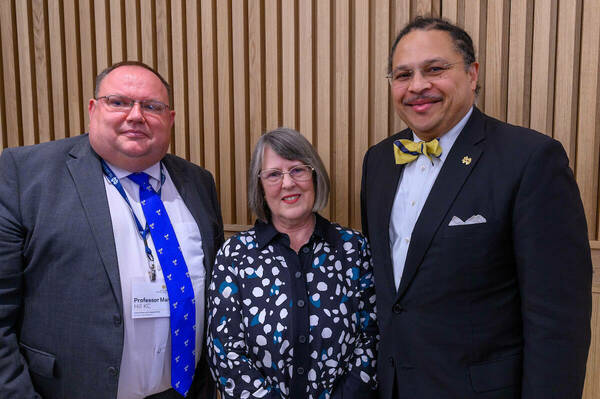
Inspired by the IRFBA, with support of 42 experts across the world, action is taking place. She thanked those at the summit who have participated and helped.
The IRFBA is helping young people ensure a new generation. One example is the development of a school curriculum to understand the importance of not discriminating against others on belief or religion.
“Children have an inherent concept of justice. Children as young as five years old can grasp this,” she said.
She also noted that FoRB is more important today because it is more at risk, and FoRB restrictions are increasing in various parts of the world. Many violations are happening and every number represents someone who is suffering because of what they believe.
“All of us who work on FoRB don’t have the same beliefs, but we believe that everyone should have their own beliefs, to have a religion, have no religion, or to convert religions,” she said.
EVENING ACTIVITY
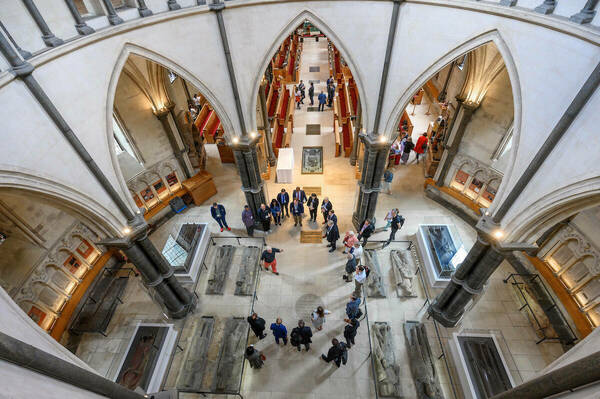
Dinner Boat Cruise on the Thames
Last evening attendees enjoyed a dinner boat cruise along the River Thames.
In addition, attendees had the opportunity to take a tour of Temple Church, one of the best-preserved medieval buildings in Europe, with powerful associations with the Magna Carta.
Read the other daily recaps from the 2023 Notre Dame Religious Liberty Summit: